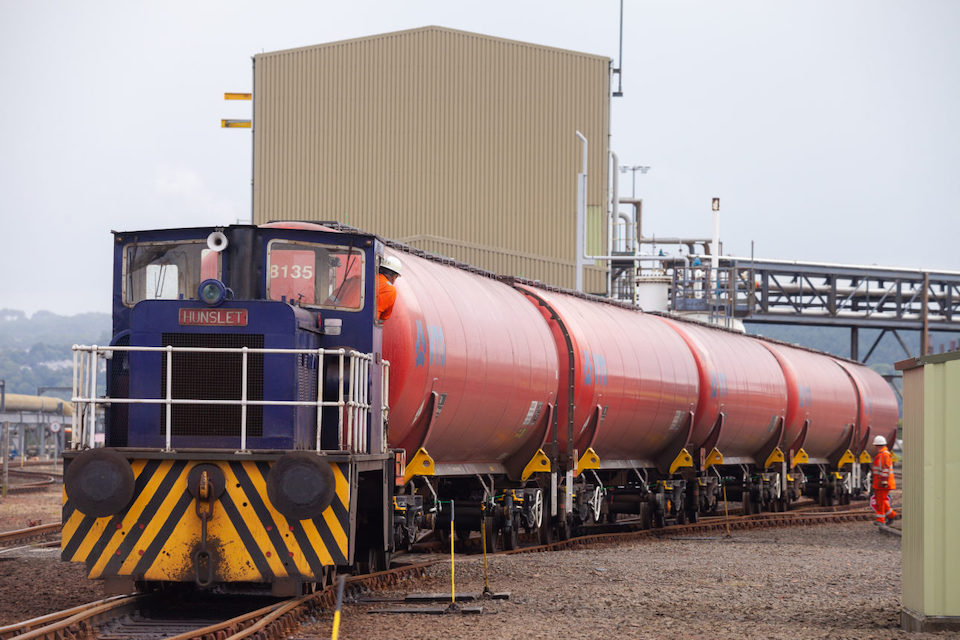Scottish oil refinery closure is mixed news for rail freight

Grangemouth. It’s not the prettiest town in Scotland. It is, however, a town that everyone in Scotland knows by name for just one thing: its one-hundred-year-old oil refinery. Now, the news has come, finally, that the refinery will not see another year in operation. The owners, Petroineos, have announced that it will all but close within a year. There are some implications for rail freight, which may or may not be positive.
Much of the rail infrastructure at Grangemouth has been developed on the back of the town’s industry. For one hundred years, this infrastructure has been dominated by the oil industry and the refinery. The blow of its imminent closure was not made any lighter by not being a surprise. The closure has been on the cards for a long time, and even Petroineos made their intentions public almost a year ago.
Connected by a web of pipelines
Will the freight railways around Grangemouth survive the closure of the iconic oil refinery? The answer is, almost certainly, yes. It will not, however, be without deep pain for the community. The Scottish government, led by the Scottish National Party, has been pilloried on all sides of the issue. Opposition parties claim they failed to take sufficient action in advance. The long-feared announcement came on the same day (Thursday, 12 September) as the First Minister, John Swinney, faced the weekly question time in the parliament. Grangemouth dominated the session.
Petroineos has said the century-old plant is losing around £400,000 (€470,000) a day. They say it can’t compete with other, more modern facilities elsewhere in the world. They want to transition the site to an import terminal. Ironically, most of the crude oil refined at the plant is from nearby fields in the North Sea. Grangemouth is connected by a web of pipelines directly from the offshore production platforms. That crude oil could be exported to other UK refineries by rail.
Changed status could signal rail freight boon
The likelihood is that around 400 of the workforce will be made redundant, leaving a rump of just 70 to manage the plant when it’s repurposed to a terminal for bulk imports. Grangemouth represents about one-eighth of the UK’s refining capacity, but it is the only refinery in Scotland. It is possible that domestically refined fuels may find their way back to Scotland, in bulk, by rail, for onward distribution. However, it is difficult to see the refocus on importing rather than refining oil as a significant industrial downgrade.

Rail operations at the refinery are quite limited. At present, the only repeat business is a train of aviation fuel heading for Prestwick Airport on the West Coast of Scotland. However, the changed status of the plant could signal a boon for rail freight from the site. If the planned repurposing as an oil terminal comes to fruition, then the need for bulk movements of liquid oil products could well be a benefit for rail freight.
Busy intermodal rail terminal
The news came in the same week as fears were realised for the closure of the steelworks at Port Talbot in South Wales. That is an even bigger blow, with almost 3000 jobs lost. While the scale of redundancies at Grangemouth is smaller, its refinery dominates the landscape as much as does the steelworks in South Wales.

However, the refinery is not the only industrial installation in the town. Grangemouth docks represent the busiest seaport in Scotland, taking short-sea sailings from domestic ports and Western Europe. That has made Grangemouth also a busy intermodal rail terminal – there are actually two terminal operators on the site. In the recent past, Grangemouth had extensive yards for mixed traffic, including coal trains. The maintenance depot has also closed.
Secret buyer for the refinery
There is a long-standing call for Grangemouth to be reconnected to the passenger network. Given the political storm that has broken over the closure, it cannot harm the prospect of a station to serve the town as part of a regeneration package. That does, however, depend on the delivery of any actual regeneration package.
It was only this Spring that Grangemouth was the host of the Rail Freight Group Scottish Conference, addressed by the Scottish transport secretary, who had to defend her government for ‘suspending’ its modal shirt revenue support package. On the other hand, one other local politician has claimed to have found a buyer for the refinery but has not revealed details. Unlike the closure announcement, which came as a surprise, the Grangemouth story may not be fully refined yet.
You just read one of our premium articles free of charge
Want full access? Take advantage of our exclusive offer




